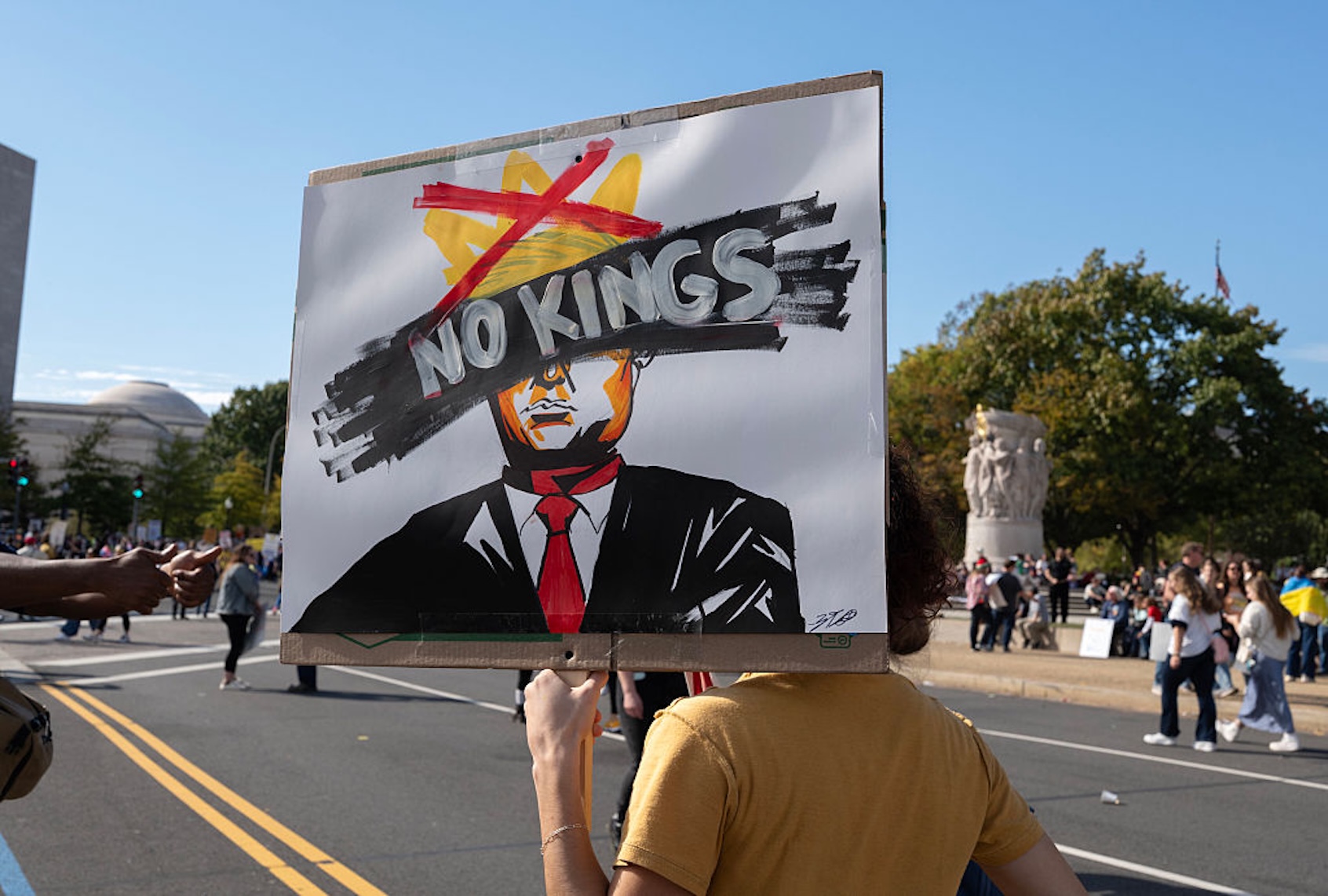World
Millions Protest in “No Kings” Movement, Challenging Trump’s Rule

Over the weekend, the United States witnessed a historic display of dissent as the “No Kings” protests materialized across the nation. With more than 2,700 individual demonstrations reported and an estimated 7.1 million participants, the event marks one of the largest days of protest in U.S. history. The movement, aimed at opposing perceived authoritarian tendencies in the government, quickly drew reactions from high-ranking officials, including President Donald Trump.
In the wake of these massive protests, the White House initially responded with mockery. Speaking to reporters aboard Air Force One, Trump dismissed the gatherings as “very small” and “very ineffective,” suggesting they did not represent the views of the American public. “I think it’s a joke,” he stated, asserting that the protests were influenced by billionaire philanthropist George Soros and claiming his administration would investigate the funding behind them.
Trump’s rhetoric took a threatening turn when he mentioned the possibility of invoking the Insurrection Act, stating, “Don’t forget, I can use the Insurrection Act. Fifty percent of the presidents almost have used that. And that’s unquestioned power.” This assertion, however, is misleading; the Insurrection Act has historically been invoked by only 15 presidents in response to civil unrest.
The “No Kings” protests were not without their defenders from the political establishment. In an appearance on ABC’s “This Week,” House Speaker Mike Johnson labeled the protests a “hate-America rally.” He emphasized that the issue at hand was not merely the individuals participating, but the underlying ideology motivating them: “They want to dismantle capitalism. They want to erase our founding principles.”
In contrast, some commentators from Fox News portrayed the demonstrators as “paid protesters,” downplaying the significance of the events. Former White House press secretary Kayleigh McEnany noted that Trump rallies appeared more substantial than the protests, while contributor Kaylee McGhee White suggested that the protests sought to establish a “leftist king,” referring to President Joe Biden.
The protests sparked a broader conversation about the state of American democracy. Critics argue that the current political climate reflects a troubling trend toward authoritarianism. As MoveOn Executive Director Katie Bethell articulated, “The millions of people protesting are centered around a fierce love for our country. A country that we believe is worth fighting for.”
In a display of irony, numerous social media posts emerged from the Trump administration that seemed to embrace the “king” narrative. On Truth Social, Trump shared edited videos portraying him in a regal light, including one where he dons a crown while dismissing critics. This prompted a backlash from protestors, who underscored the absurdity of such imagery in the context of a democratic society.
The discourse surrounding the protests has raised important questions about the balance of power in the United States. While Trump’s supporters continue to downplay the significance of the protests, the sheer number of participants suggests a significant segment of the population is concerned about the direction of the nation.
As the political landscape continues to evolve, the “No Kings” movement may serve as a pivotal moment in the ongoing dialogue about democracy and civil liberties in the U.S. The important questions ahead are whether the right can continue to dismiss these protests and if the media will hold officials accountable for their responses.
With millions mobilizing and expressing their discontent, it is clear that many are determined to ensure their voices are heard in the ongoing struggle for democracy.
-

 Lifestyle1 week ago
Lifestyle1 week agoSend Holiday Parcels for £1.99 with New Comparison Service
-

 Science2 months ago
Science2 months agoUniversity of Hawaiʻi Leads $25M AI Project to Monitor Natural Disasters
-

 Science2 months ago
Science2 months agoInterstellar Object 3I/ATLAS Emits Unique Metal Alloy, Says Scientist
-

 Science2 months ago
Science2 months agoResearchers Achieve Fastest Genome Sequencing in Under Four Hours
-

 Business2 months ago
Business2 months agoIconic Sand Dollar Social Club Listed for $3 Million in Folly Beach
-

 Politics2 months ago
Politics2 months agoAfghan Refugee Detained by ICE After Asylum Hearing in New York
-

 Business2 months ago
Business2 months agoMcEwen Inc. Secures Tartan Lake Gold Mine Through Acquisition
-

 Health2 months ago
Health2 months agoPeptilogics Secures $78 Million to Combat Prosthetic Joint Infections
-

 Lifestyle2 months ago
Lifestyle2 months agoJump for Good: San Clemente Pier Fundraiser Allows Legal Leaps
-

 Science2 months ago
Science2 months agoMars Observed: Detailed Imaging Reveals Dust Avalanche Dynamics
-

 Health2 months ago
Health2 months agoResearcher Uncovers Zika Virus Pathway to Placenta Using Nanotubes
-

 Entertainment2 months ago
Entertainment2 months agoJennifer Lopez Addresses A-Rod Split in Candid Interview









